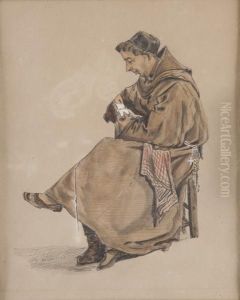Theodor Duclere Paintings
Theodor Duclere, born in 1816, was a notable French landscape painter whose artistic journey spanned much of the 19th century, a period rich in artistic evolution and expression. Although not as widely recognized as some of his contemporaries, Duclere's work offers a fascinating glimpse into the landscape painting genre of his time, reflecting the influences and stylistic tendencies of the era.
Duclere's artistic career was primarily centered around Paris, the heart of the French art world, where he was exposed to the burgeoning Romantic movement. This movement, characterized by its emphasis on emotion and nature's sublime beauty, significantly influenced Duclere's approach to landscape painting. His works often depicted the picturesque and dramatic landscapes of France, focusing on the interplay of light and color to evoke emotional responses from the viewer.
Throughout his career, Duclere exhibited his works at various salons and exhibitions, the primary venues for artists to gain recognition and sell their work during the 19th century. These exhibitions were crucial in establishing Duclere's reputation as a landscape painter. Despite the competitive nature of these venues and the shifting tastes of the art market, Duclere managed to carve out a niche for himself within the Parisian art scene.
Duclere's contributions to landscape painting were part of a larger movement that sought to capture the natural beauty of the world in a time of rapid industrialization and social change. His works, characterized by their detailed depiction of natural scenes and skillful use of light, reflect a deep appreciation for the natural world and a desire to preserve its beauty amidst the changing landscape of the 19th century.
Theodor Duclere passed away in 1869, leaving behind a body of work that, while perhaps not as celebrated as that of some of his peers, offers valuable insight into the landscape painting of his time. His paintings continue to be appreciated by art historians and collectors for their beauty and historical significance, serving as a testament to Duclere's skill and dedication to his craft.
